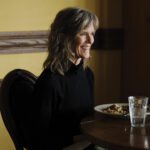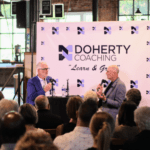Lessons From My Father
June 3, 2019

Generosity, patience and martinis with a twist — a writer’s remembrance in honor of Father’s Day.
by Michael J. Solender
I think of my father most often early in the mornings.
Many years ago, when I was a teen, it was in those pre-dawn hours that we connected so deeply, our Minneapolis home dark and shuttered as my mom and two older brothers clung to another hour of sleep as tightly as plastic wrap on a microwave burger at the 7-11.
I’d inherited my father’s fondness for rising before the sun, and we developed a quiet ritual of coffee and breakfast before the others arose. It was our time to simply read the morning paper, the silence punctuated by the complaint of the furnace or a corny joke he told, usually for the millionth time — though I laughed anyway because I knew he wanted me to. It was then he showed me how to flip eggs over easy, and I convinced him that yes, chocolate chips do belong in pancakes.
My dad never played catch with me in the yard. We never went fishing or camped out under the stars. He didn’t help me with my homework, take my side in arguments with my brothers, or give me “the talk” about what happens in the spring when young men’s thoughts turned to “fancy.” Despite these fatherly transgressions, ones I perceived more grievous in my youth than I do today, he was always there for me and became a role model I strive to emulate today.
When I was 17 and a junior in high school, I wanted desperately to skip my senior year and gain early acceptance into college as my best friend had done. My father was adamant in his denial of this “foolish notion,” citing immaturity over intellect as an obstacle to my ultimate success. He was right, of course, and I learned that seasoning and perspective came with experience, a commodity Dad taught me to value.
During my four years at college, I was amazed at how much my father learned, as the saying goes, and in my case, it could not have been truer. Learning how much I didn’t know was a lesson he taught me not by pointing out my minimal exposure to life’s mysteries but by demonstrating how being curious and open to new people and experiences could illuminate and reward.
One day, I came home from school to find my father sharing a beer at the kitchen table with a large man sporting a bushy upside-down “U” of a mustache, chomping on an unlit cigar only slightly smaller than my arm. The two joked like old friends, though the guest was a stranger to me and spoke in broken English with a heavy Cuban accent.
His name was Luis Tiant, a famed Major League Baseball pitcher who starred for the Cleveland Indians and Boston Red Sox. Tiant played a single season for the Minnesota Twins, and there he was one late afternoon in my kitchen, cutting up with my father. Dad, who ran his own business selling commercial HVAC systems, had played in a golf tournament with Tiant and invited him home afterward.

When I asked Dad how he had the gumption to invite this superstar to the house, he simply told me, “I just asked him. Extend yourself to experience new and exciting things — they don’t just come to you unless you make them happen.”
Dad also taught me to respect ritual, and how ceremony can cement both occasions and relationships.
After I took my first professional job out of college as a recruiter and found myself on assignment in New York City, Dad insisted on hosting me for our first father-son cocktail at a “real lounge.” He and my mom were on vacation in the city, and he arranged to meet me at the fabled Oyster Bar in the basement of Grand Central Station. The NYC institution is a true guys haunt, where the bartenders wear black ties and crisp white linen coats while Sinatra provides the soundtrack and trains rumble overhead.
He ordered us each a martini, straight up, with an olive and a twist — my preference to this day.
“To you, Mikey-boy,” he said. “The world awaits your success.”
I discovered then how the right setting, accompanied by a few choice words, can make an everlasting impact. With that cocktail, in that bar, and at that moment, our relationship was on a new plane.
It’s been more than two decades since my father passed. Of all the lessons I learned from him, it was his joy for life and championing of others I’ve come to revere most. Life was one great big apple for Lou Solender, and he wanted everyone — especially his wife and kids — to have a huge bite every single day.
I saw how, with a discreet phone call or two, he opened doors for my mom as she started her own business late in life. He always bragged on his kids, not in an obnoxious way, but rather with pride and a bit of vicarious enjoyment at each of our successes.
My dad was all about whisker rubs, bear hugs and family meals where we celebrated each other’s accomplishments. He gave more than he got, because the joy he received from giving of himself was the fuel that fired him for 78 years.
What better legacy can a father leave his son? SP





